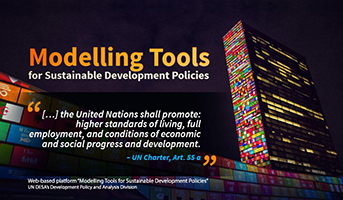“The website is a platform to make the modelling tools used in our capacity development projects widely available,” Mr. Montiel explained. “By doing this we are aiming at enhancing collective capacities to continue providing support to UN Member States in assessing integrated policy options in line with the Agenda 2030 framework.”
The new interactive web platform, developed by UN DESA’s Development Policy and Analysis Division (DPAD), the Division for Sustainable Development (DSD) in close collaboration with other partners and powered by the United Nations Office for Information and Communication Technologies (UNOICT), contains various tools to assist countries in the design of policies and strategies to help implement the 2030 Agenda for Sustainable Development and its 17 Sustainable Development Goals (SDGs).
 Featured on the new site are economy-wide models to assess the multiple economic impacts of policies and shocks; models that trace the effects of policies on social inclusion and poverty; that show the relation between water, energy, land-use and climate; how water use should be considered up-front when designing energy policies; and that simulates universal access to electricity by 2030 with the least cost technology option in 44 African countries.
Featured on the new site are economy-wide models to assess the multiple economic impacts of policies and shocks; models that trace the effects of policies on social inclusion and poverty; that show the relation between water, energy, land-use and climate; how water use should be considered up-front when designing energy policies; and that simulates universal access to electricity by 2030 with the least cost technology option in 44 African countries.The intention with the platform and the different models it will be featuring, is to help scale-up capacity in countries, inform development policies and help prepare transformative development strategies that in the end will contribute to eradicate poverty, halt rising inequality, avert climate change and reverse the infringement of environment limits.

